On Gold Mountain Read online
Page 13
In Fong See’s own home, the world also continued to change. In 1909 the German midwife was called one last time, to attend the birth of Florence, named in honor of Mrs. Morgan, Ticie’s only woman friend. Florence’s Chinese name was Jun Oy—true love. With five children, two stores, and forty-four acres she wished to develop, Ticie had little time for herself. She knew how lucky she was compared to the Chinese wives of laborers, who never had a midwife to see to them. Instead, her neighbors worked until the last minute, then squatted in a corner, groaned, and there would be a new baby son or daughter. After the birth, the woman got up again, cut the cord, washed the baby, and resumed working—doing piecework, rolling cigars, tying onions and scallions into bunches.
The laborers’ wives had hard lives, while the wives of merchants led stultifying, sheltered ones. Merchants’ wives rarely stepped outside their upstairs apartments for fear they would be kidnapped. Like Ticie, many of them had lesser cousins and nephews to do housework, cook, and shop. Some women never left the house except for a moon yuet, the one-month celebration of the birth of their children. Days stretched out with embroidery as their only activity.
Ticie knew all this because she reached out to some of the Chinese mothers in Los Angeles. When a neighbor gave birth to a son, Ticie was usually one of the first to arrive with the traditional Chinese “baby soup” of peanuts, pork, whiskey, and ginger. After Florence’s birth, many of the women returned the kindness, promising that the soup would painlessly bring in Ticie’s milk and help coagulate her blood.
With each new child, Ticie gained in status. With each year that the business prospered, she gained in power. One day she said to her husband, “You’re not under the rule of the Manchus anymore. You live here.” He listened and cut off his queue.
CHAPTER 6
FAMILY DAYS
1914–18
ONE day in 1914, Fong See closed his shop at 50 South Raymond Avenue in Pasadena and boarded the streetcar to take him back to Chinatown. He was a handsome man who looked far younger than his fifty-seven years. Today, as usual, he wore an elegant, tailor-made suit. The only incongruity in his appearance of cultivated refinement was the sack of fruit he carried. No one on the car knew that the day’s earnings nestled among the oranges.
Business in Pasadena was more than he could have hoped for. His customers came to the resort for the winter season—December through May—with suitcases full of cash. They had a love of beauty. They embraced culture. And they had an eye for things Oriental. Fong See knew that when they returned to their eastern homes they talked about the adventures they had coming into his store. In his mind he could even hear them: “You’ve just got to go to the F. Suie One Company. That’s the place to go, all right.”
In Pasadena, he only had non-Chinese customers—most knowledgeable, a few ignorant. The brothers Charles and Henry Greene—among the founders of the California Craftsman architectural movement—understood what he had. They appreciated the simplicity of line, the quality of the wood, the restrained motif. When they came in, they liked to bend over a table or cabinet and examine the skillful tongue-and-groove joinery.
Grace Nicholson was another good customer. She had come to California in 1901 with a few hundred dollars and her skills as a stenographer. She’d quickly abandoned clerical work to open a shop on South Raymond, where she sold American Indian baskets and jewelry. After Fong See moved in next door, she’d taken an interest in Far Eastern merchandise—not just Chinese, but also Korean, Japanese, and Indian. Now, like Fong See, she also sold Asian art to collectors and museums. Fong See didn’t worry about the competition—though Victor Marsh, John C. Benz, and W. W. Gerlach also sold Asian merchandise in Pasadena—because the way Fong See saw it, there were plenty of customers for all of them, with the big hotels so close by. And he was the only one to hold auctions at the Green and Maryland hotels, where he served tea and entertained the tourists with far-fetched tales of kingdoms, warlords, and pirated antiques.
Besides, he had his two other branches in Long Beach and Chinatown. He didn’t concern himself too much with Long Beach. Wing Ho did a wonderful job, with only an occasional visit from Fong See, which usually ended up as a family excursion to the amusement park on the Pike. Fong See was much more involved with the Chinatown store, where Letticie saw to the day-to-day business and looked after the family upstairs. This division of labor made good business sense. Fong See, as a Chinese man, was a novelty in Pasadena. Letticie, as a white woman, offered a sense of security to Caucasians who wanted to venture down to Chinatown, which still had a reputation in Los Angeles as a dangerous place.
Fong See was the most respected businessman in Chinatown, and the only importer of any consequence. That was why, when a sojourner returned to China, he brought his most precious belongings to Fong See in hopes of getting extra cash. What cultured Chinese would have perceived as junk—usually simple household goods such as everyday porcelain or an incense burner—was intriguing to white customers. Fong See could sell these items for ten times what he’d paid.
Fong See still loved money and automobiles. He loved to look through magazines and brochures on cars. In time he would buy his elder sons—Milton and Ray—new cars, a Packard, a Hudson, a Stutz, a Willys-Knight, a Cadillac, a Lafayette—all beautiful, with long, sleek lines and rich colors. If that meant hiring a chauffeur/mechanic to keep the things going, that’s what Fong See would do. From his first days in this country he had realized that only money could protect a man—not a family association or a tong. If you had money, whether it was here or in China, you had protection. And he was a man very well protected.
As far as Fong See was concerned, he had a faqade that needed to be maintained, and his wife would not cooperate. She refused to do as she was told. He had said many times, “No roller-skating. I do not want to see children in skates. Waste of time!” Yet he knew from his brother, and from others who kept him informed, what his wife and children were doing in Chinatown. As he came home from Pasadena, Ticie would call out, “Pa’s coming,” and the younger children—Eddy, Bennie, and Florence—would take off their skates and hide them. No one said a thing as he came in, but he knew just the same.
He was irritated about the boys and furious about Florence. He’d seen to it that Florence was the most photographed Chinese girl in the entire city, and perhaps in the country. She had a unique look about her—solemn, quiet, pensive—that he was always trying to capture. At least once a year, but often every few months, he took her to different photographers—first the Elite Studios, then Hartsook, then Edwin Williams, over on Bonnie Brae. Fong See had photographs of his daughter in Chinese clothes. He had others of her dressed like a princess in organza and lace, with a big ribbon in her hair. She posed on carpets, on piano stools, and holding an armful of paper flowers. She was dainty and perfect. She was not the kind of girl who should be out roller-skating!
He tried to be stern with his wife. He was stern. But in some things Ticie was adamant. When the boys started introducing his Florence as “Sissee,” he was angry. “She has this name for a reason. Am I now to have another child who does not go by the proper name? If you want to call her something else, then call her by her Chinese name, Jun Oy. Not this Sissee.” But his wife just laughed, patted him on the arm, and said, “Now, Pa, what would we say to the boys? That’s their name for her. When customers come in the store and ask who our daughter is, Milton answers, ‘That’s Sister See.’ It’s sweet, don’t you see? Sister See is Sissee.”
They argued constantly about how to raise their daughter. “She is an American girl, Suie. Let her be,” his wife said.
“No, she is Chinese daughter. She needs to be …” He struggled over the Chinese words and concepts. His daughter needed to be trained to be virtuous, graceful, courteous, polite, and obedient. “No dancing. No games. Stay home. Learn to sew. Take care of house. This is good daughter.”
“But, Suie, that’s no fun. She’s just a girl.”
“Girl will grow up
. She must learn the Three Obediences. When at home, obey father. When in home of husband, obey husband. When she becomes a mother, obey son.”
Ticie had laughed at that. “That’s downright silly.”
How could he make Ticie understand? “No good husband for Jun Oy if not good daughter. She must learn.”
It made no difference to Ticie how often Fong See put his foot down. She simply wouldn’t obey him in matters concerning their daughter. He could trace Ticie’s independent streak to his one big mistake. He should never have given in on the issue of his queue. Well, of course she was right. He would have cut it by now anyway. No one had a queue anymore, since Dr. Sun Yat-sen and his Republic. But that wasn’t the point. First the antiques, then the queue, then his daughter’s name, that’s how it went. Now Ticie was running the Los Angeles Street store. Always she nagged him. “We need to improve. We must improve. No more curios. We’re in the antique business.” When they were in China, he had wanted to buy baskets and fans, and Ticie had said, “Well, of course you should, dear. We’ll always have walk-in trade that won’t be able to spend much money. They’ll just want a little remembrance of their visit to Chinatown. But those are just curios, don’t you see?” She’d wanted to buy architectural wood carvings, clay idols, handicrafts, and embroideries, including shoes for bound feet and children’s caps. Those things he bought, but he’d also gone ahead and shipped crates of fans, baskets, and wickerware.
The profits on antiques were clearly better. “You see, Suie,” Ticie said, “Americans aren’t that familiar with old Chinese things, but when they see them they want them.” Ticie knew the merchandise. She knew how to talk to the customers. What was it Mr. White had said? “Your wife has a nice personality, and people want to buy from her.” This was no way for a proper Chinese wife to act. But Fong See just couldn’t seem to win an argument with her, because her logic was too clever.
When he wanted the children to go to the Methodist Chinese-language school run by Mrs. Leong, Ticie said, “Absolutely not! We’re in America. We should do as Americans. Our children are American. They must learn the ways of our country.” Ticie saw no reason for her children to learn Chinese. In fact, she thought that all the children in Chinatown would be better off spending their time learning English rather than losing their few free childhood hours to the study of calligraphy and classics.
He couldn’t completely fault his wife. The children were half Caucasian, after all, but he was angry nevertheless. A man should be the boss. A man is the king, and he was the king of Chinatown. He wanted to rule “with an iron hand.” Marriage should be a simple thing: the wife makes requests and the husband either grants them or doesn’t.
Last week his wife had said, “The children need shoes again.”
He answered, “All they do is drag their toes on the ground.”
“Suie, the streets aren’t paved in Chinatown. Shoes are going to wear out faster than if we lived in a house in a neighborhood that had sidewalks.”
That made him mad. He wasn’t going to build a house in La Habra or Long Beach. Those properties were too far away, and they were in Letticie’s name. He loved and trusted his wife, but why should he take the risk? But whenever he sent money back to Dimtao to help the villagers, or whenever he purchased another mou of land, she started again. “What good will land or houses in Dimtao do us? You help everyone in your family, but you won’t help our family. Why is that, Suie? Why?”
He could have said, “The people in the village have no opportunity for education, so I started a school. When they have famine, I send money to buy food.”
Instead he said, “I don’t want grass. I don’t want flowers. I don’t want trees. That’s crap.” What he meant was that white neighborhoods could be unpredictable.
“Suie, it’s not right to have all the boys and Sissee in one room. Besides, we should have a place where people can visit, not just the store. …”
He thought of an old saying from his village: “Waste no time quarreling with a woman.” Ticie made him so crazy that his mind looped and looped in all this nonsense. Finally, he had gone back to her original question. “No shoes, final word,” he said sternly.
He did triumph in other matters. He insisted that all the boys come home from school to work. He could control them that way, keep track of them, make sure they did as he said. Sissee, on the other hand, was not allowed to work, except to help her mother decorate baskets and do her embroidery. “You stay in the store,” he told his daughter. “You be quiet. A girl must do needlework. Go do your embroidery! That’s women’s work. That’s girl’s work.” He checked his daughter’s progress daily. He knew that sometimes she cried over her needlework, but in this matter he would not yield. No man would marry a Chinese girl if she didn’t master the womanly arts.
All this thinking had put him in a foul mood by the time he disembarked from the streetcar and climbed the stairs to his family’s apartment above the store at 510 Los Angeles Street. When he walked in, he immediately questioned the two older boys about their day. By not sending his sons to Chinese school, he was able to send them door to door selling curtain rods, tassels, and jade rings. The ladies in Los Angeles’s finer homes like to tie the rings with silk ribbon or cord and use them as handles or pulls on draperies, or on bells to call their houseboys.
“You do good selling today?” he asked, knowing what their answers would be. Milton would have come home with a pocket full of money and Ray would be empty-handed.
“No,” Ray answered sullenly.
“What you do? Go for sleep? You no good boy. You good for nothing.” When Ray didn’t bother to answer or even look at him, Fong See spat out, “Phaa! No good.”
He turned his attention to the others. Fong See noticed the rosy cheeks of his two youngest children and realized grimly that they had been out roller-skating. Knowing he wouldn’t get anywhere if he mentioned that, he asked, “Where did you get those new shoes? Did your mother buy those for you?”
At that moment his wife walked into the room, briefly threw her arms around him, took his sack of oranges, and said, “Of course not, Suie. Mrs. Morgan bought all of the children new shoes. Isn’t she a dear?” He looked into the faces of Eddy and Sissee and knew that his wife was lying.
At fourteen, Ray, like most boys his age, had nothing but contempt for his parents and family. He hated Chinatown. He hated seeing poverty every day. He hated the smell. He hated his father’s idea of child-rearing: “If you love your boy, apply a stick. If not, stuff him with candy.” He hated the way his father rapped the kids on the knuckles with his chopsticks for not using proper table manners. Most of all, he hated how his father kept them all under his iron fist, as though he were the boss of them all, as though he knew everything there was to know in the world, when all he was was an immigrant who could barely speak English.
Ray hated his brother, Milton, who got everything—all the love, all the treasures, all the best clothes—just because he was the firstborn. A Chinese custom, when they were all American. For as long as Ray could remember, he had wanted to grow taller than Milton. One day he couldn’t stand it anymore, and he burst out, “I’m going to grow to be six feet tall!” Everyone laughed at him. No Chinese ever grew that tall, they said. So far, at least part of that wish was answered. He grew taller than anyone else in the family, and was still convinced that he would eventually reach six feet because their laughing logic didn’t make any sense. He wasn’t Chinese, couldn’t they see that? Now he was the one who should have been getting clothes first, then passing them on to Milton. Of course, it didn’t happen that way. Milton still got his clothes first, because he was due them as first son.
Ray was only fourteen, but he had pride. He didn’t like to be some sort of object to be paraded out as a way of getting a sale. He remembered as a tiny boy that whenever the man from the Mission Inn, out in Riverside, came to the store, his father would get all the kids dressed in Chinese getups, like a bunch of Manchu princes. After hours of n
egotiation, with the deal finally closed, the man from the Mission Inn would ask to take a few snapshots. Milton and Ray would have to stand outside the store with the man’s daughter and have their pictures taken. She would always be placed in front because she was the important one. Milton and Ray were decoration. He hated that. He hated that girl, and once kicked her so hard she cried.
Sometimes he tried to think if there was anything, just one thing, that he had liked growing up. But there were only stupid memories. He could remember how they’d all walk with his mother to the streetcar and his little brother, Bennie, would be raising Cain. His mother would be soothing and comforting. Then she’d start licking her finger and wiping their faces as the streetcar came rumbling down the street. He hated that. He remembered how when he was really little he’d rested his head on the ceramic water buffalo with the large glass eyes when it was hot. He must have been awfully young, because he knew he’d sometimes napped there. But his father had sold it to the man at the Mission Inn, and that was that.
He hated them all. (With one exception. He loved his mother, not that he could ever say it. He was too old for that kind of stuff.) He hated the gamblers in the next basement over. He hated that his father was a partner in one of the lotteries. He hated how his father made everyone work hard every day: first uncrate, then straighten the nails. He hated the idea that his father wanted to expand to one store per son—Chinatown, Pasadena, Ocean Park, Long Beach. He hated it when his father went to China after the revolution of 1911 to scoop up belongings from the fleeing and desperate, just as he had after the Boxer Rebellion.
Ray hated the damned basket trade. He knew all the vices in Chinatown—the gambling, the opium, the women—but his father had only one vice, baskets. They were like a drug to him. How many could a person use, after all? His father bought them in groups of three, nestled together. First they had to be pulled apart. And the bugs! Ray and the other kids had to pick them out. The fine white dust of bug-shit filled the air, getting in their mouths and nostrils. The biggest baskets were sold off to laundrymen. The medium-sized ones went to merchants for storage. The little ones were, quite simply, the bane of his existence.

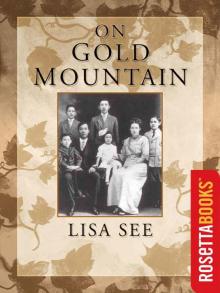 On Gold Mountain: The One-Hundred-Year Odyssey of My Chinese-American Family
On Gold Mountain: The One-Hundred-Year Odyssey of My Chinese-American Family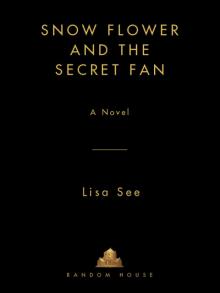 Snow Flower and the Secret Fan
Snow Flower and the Secret Fan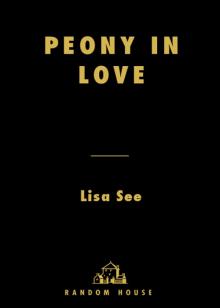 Peony in Love
Peony in Love Flower Net
Flower Net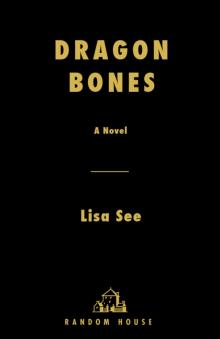 Dragon Bones
Dragon Bones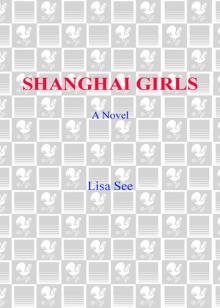 Shanghai Girls
Shanghai Girls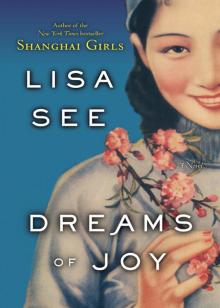 Dreams of Joy
Dreams of Joy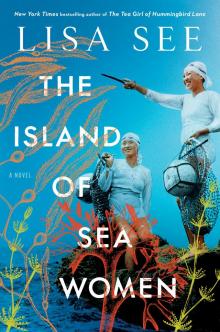 The Island of Sea Women
The Island of Sea Women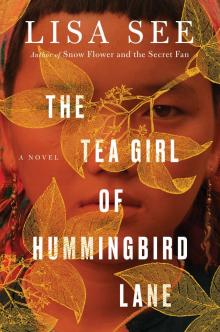 The Tea Girl of Hummingbird Lane
The Tea Girl of Hummingbird Lane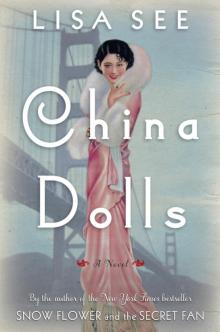 China Dolls
China Dolls The Interior
The Interior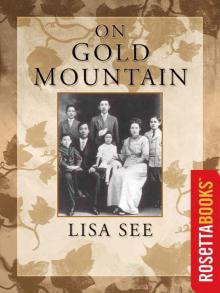 On Gold Mountain
On Gold Mountain